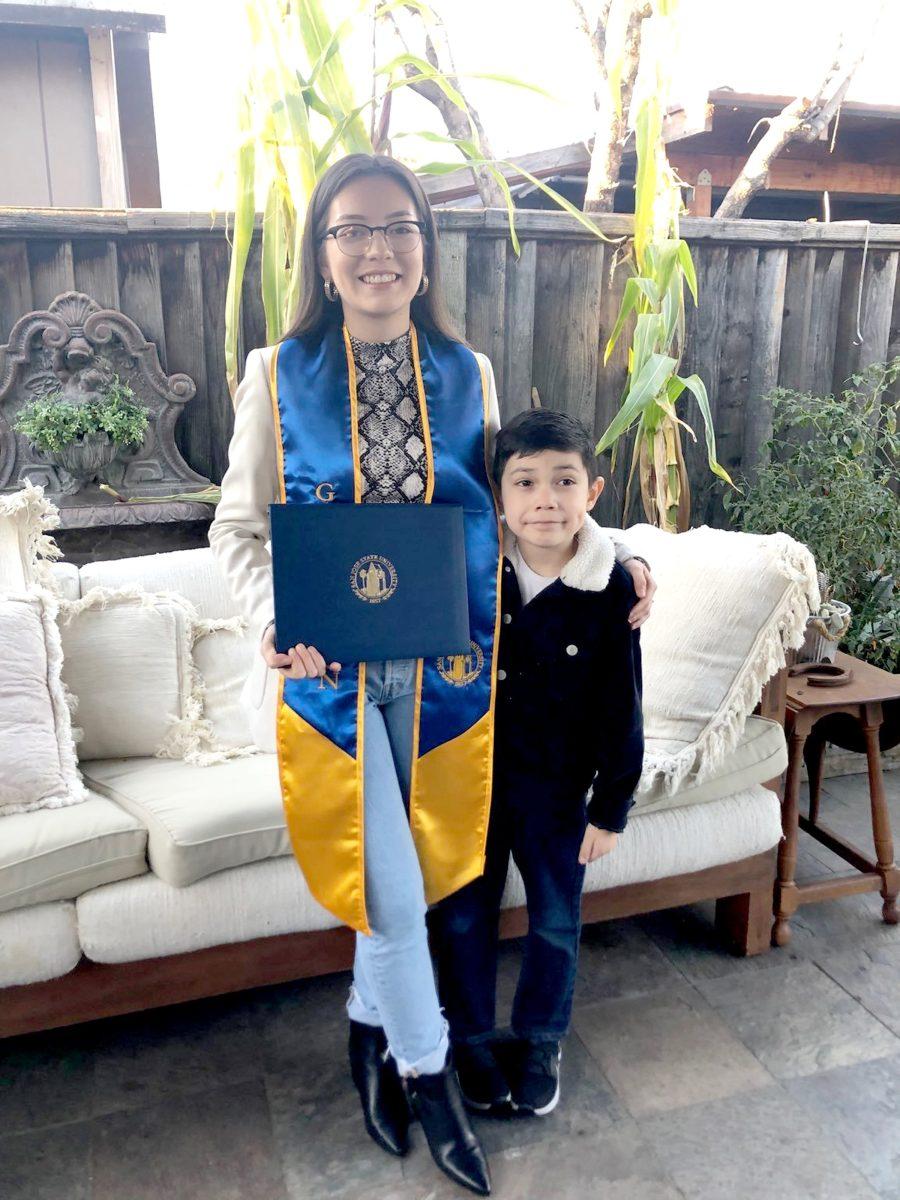The responsibilities of a student caregiver were burdensome long before March 2020, but some said the pandemic exacerbated them, leaving students mentally and emotionally exhausted.
Polet Ramirez, a San Jose State graduate student, said she has difficulty juggling different “hats” including being a full-time student, a graduate assistant and a caregiver to her 6-year-old brother with Type 1 Diabetes.
“I don’t catch a break,” Ramirez said in a Zoom call. “If it’s not school, it’s work. If it’s not work, it’s me taking care of my brother.”
She said her brother used to attend school with a nurse who constantly monitored his insulin, but since the pandemic began she’s assumed a more prominent role.
“It’s more difficult now . . . because it’s just me and my mom that know how to take care of him,” Ramirez said.
Ramirez said she experienced a lack of motivation and “caregiver burnout” many times within the last year which have played out in various ways.
She said she’d take out her frustration on the wrong people during moments of burnout, including her mother. Other times she said she’d feel defeated and think “he’s not my kid. . . why am I doing this?”
Maria Fusaro, an SJSU child and adolescent development assistant professor, said caregiver burnout can be felt by anyone looking after someone else, but it’s exacerbated during the pandemic.
“The stressors of being a [parent or caregiver] are always present but are multiplied under the pressure of COVID,” Fusaro said in a phone call. “We’re concerned about parenting stress both because of its effects on the parent and child, including their emotional health and well-being.”
Out of 30,593 undergraduate students from 10 different U.S. public research universities, 5.7% reported being caregivers for children during the pandemic, according to a University of California, Berkeley Student Experience in the Research University (SERU) Consortium survey.
According to the survey, 3,236 students said they were caregivers for other adults and 874 said they were caregivers for both children and adults during the pandemic.
The survey was administered in May 2020 to evaluate the impact of COVID-19 on the student experience.
The SERU survey results found the pandemic has worsened financial hardships, mental health and the ability to learn remotely for many student caregivers.
UC Berkeley psychology sophomore Annelise Hayes said balancing online classes and caring for her 2-year-old nephew took a heavy toll on her during Fall semester.
“I’m taking the [Spring 2021] semester off . . . I still have incomplete grades from [Fall] semester,” Hayes said in a Zoom interview. “I could tell early on that it was too much strain on my mental health . . . I wasn’t eating, showering, sleeping, things like that.”
Hayes said her nephew consumed a lot of her physical and emotional energy and while she had “zero hesitation” to care for him, she didn’t have time for herself in return.
She moved in with her sister, who is a full time health care worker in Orange County, last April after her nephew’s daycare closed.
“If you think about it, you’re replacing his time in daycare that has kids, toys, games, crafts, movies, snacks and all that with an overworked depressed college student and an overworked single mom,” Hayes said.
Because caregiving while studying or working full time can be overbearing during the pandemic, Fusaro said students should schedule self-care time.
“If you’re able to take the child outside to take a walk around the block or to a park then that’s great for you to get that bit of fresh air and time away from sitting at a desk or staying indoors,” Fusaro said.
Hayes said although her nephew isn’t old enough to understand the pandemic, he’s been misbehaving and throwing tantrums significantly less now that she’s not tied to her laptop.
“You think kids don’t know when [adults] are mentally absent or somewhere else, but I don’t think that’s the case,” Hayes said.
Behavioral problems have increased among many children since shelter-in-place mandates began, according to a Jan. 23 peer-reviewed Southern Gerontological Society article.
The increase in behavioral problems put caregivers’ resilience and patience at its lowest, according to the article.
Fusaro said children look for a caregiver who responds when they try communicating and who engages with them face-to-face both verbally and nonverbally.
“I don’t want to make it sound like you have to be with the child all the time to have a good relationship,” Fusaro said. “It’s possible that you have a child who’s maybe going to another caregiver for hours everyday.”
She said because many support networks came “crumbling down” a year ago, students should ask for help in any way that’s available to them. This includes asking a friend or family member to help with grocery shopping, laundry, meal preparation or errands.
Those who felt they had no choice in becoming a caregiver during the pandemic reported feeling burdened, according to a 2020 study by The National Alliance for Caregiving.
Ramirez said as the oldest sibling, she feels a sense of responsibility to step up as a caregiver which prevents her from having time for herself.
“The [weekday] mornings are for my younger brother, so I only have three hours in the day for myself because once 4 p.m. hits, I’m in class until 10 p.m.,” Ramirez said, adding her weekends are like “30 minute breaks.”
She said she also feels responsible because her parents mostly speak Spanish and it creates a language barrier when her brother needs help with homework in English.
“[My mom] teaches him and it’s hard to teach a language she’s not proficient in,” Ramirez said. “That falls on my end to be the person to correct certain grammar mistakes and be present when he is doing his homework.”
Ramirez said her responsibilities have “no boundaries” but her and her mom try their best to coordinate who’s cleaning, who’s in charge of the house and who’s taking care of her little brother.
Fusaro said it’s important for student caregivers to be kind and easy on themselves right now because circumstances are challenging.
“A child would be really fortunate to have a parent who’s a student . . . it means that their parent [or caregiver] is working hard on their education, advancing their career and their family’s future,” Fusaro said.






































